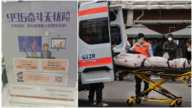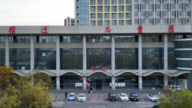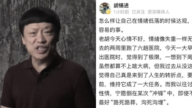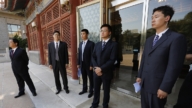【新唐人2011年12月1日訊】2010年兩會期間,中共教育部曾以「政府買單費用太大」,回覆人大代表對全國校車安全工程的提議。本臺記者在採訪中也發現,正寧縣幼兒園和教育部同樣,在校車安全問題方面反應冷漠。佛山小悅悅事件後,倍受拷問的中國人的良知,再次提到了人們眼前。
據2011年第46期的《中國經濟週刊》報導,在2010年兩會期間,全國人大代表、華中師範大學教育學院教授、長江教育研究院院長周洪宇,提交了一份《關於實施全國校車安全工程的議案》。建議讓校車在行駛過程中享有一定特權。
之後,教育部給他回覆說,如果在全國範圍內的學前和義務教育階段購買校車,政府需要投入3000億的預算,而且一年的運行、維護費用為1500億,最後的結論認為,4500億的政府買單費用太大。
不過周洪宇認為,經費不足不是推託的藉口,因為除了美國,法國,日本等發達國家,經濟並不太發達的古巴、墨西哥等也建立了比較完善的校車管理體系。關鍵是政府想不想做的問題。
與目前校車安全引髮網絡討論的熱烈相反,正寧縣幼兒園的有關人士也表現出了和教育部同樣的漠然。
正寧縣幼兒園辦公室李女士:「我沒有看法,我認為,當汽車產生的那一瞬間就會有肇事,就像醫院設有太平間一樣。(校車改革)這是政府領導的事情,我沒有發言權。」
據不完全統計,2010年10月到2011年9月,一年內中國各地共發生校車事故22起,死亡人數達到47人,平均每月有4名兒童慘死在上下學的路上。
正寧縣幼兒園辦公室李女士:“就說它不發生在我們正寧,或許發生在甚麼其他地方。咱們中國車的超載,輪船超載,貨車超載,運貨超載,包括自行車也超載。這是一種,在中國來說我覺得是非常正常的。只不過正寧縣城幼兒園這件事讓媒體曝光了。」
教育部和幼兒園相關人士對涉及兒童生命安全問題的這種表態並不是第一次出現,從毒奶粉事件以來,政府的一系列處理和態度,使得學生家長在校車問題上也表示悲觀。
學生家長:「我沒有看法,我也不抱任何希望了。那毒奶粉事件有希望嗎?汶川大地震,那個豆腐渣工程啊,那希望小學有希望嗎?所以說啊,最大的希望,我是希望那些家長們好好想一想,寧可自己再多花一點錢,可能是說想其他的辦法,也不要把希望寄託在甚麼政府部門身上了。」
2011年已近年底,如果真如溫家寶日前所說,政府要加大對校車的投入,那麼對校車的預算就應該在今年底寫入中央和地方的財政預算,這樣明年才有可能真正的推行,不過就目前情況來看似乎還沒有動靜。
與此形成對比的是,不久前國內媒體披露,中共各級政府在年底「突擊花錢」,寧可買貴的不買對的。根據財政部的統計數據顯示,今年財政部門必須在剩下的近兩個月中確定超過3.5萬億財政資金的去向。
另據國家財政部、國家發改委和國家統計局調研數據顯示,中共黨政機關及行政事業單位公務用車總量為200多萬輛,每年公務用車消費支出1500億元至2000億元,還不包括醫院、學校、國企、軍隊以及超編配車,每年公務用車購置費支出「增長率為20%以上」。
新唐人記者朱善智、尚燕、王明宇綜合報導。
School Bus Incident: Chinese People Have Lost Hope
In 2010, the Chinese Communist Party』s (CCP) Ministry of
Education responded to a proposal made by a People』s Congress representative,
regarding school bus standards and regulations,
saying that it would cost too much money.
Our NTD TV reporter also found that the recent school bus
tragedy that happened in Zhengning County was related to
a similar attitude of their management and educational bureau.
The latest and worst series of similar incidents involved
a Foshan City little girl named Yueyue who was run over by two vehicles.
The Chinese people』s conscience has been tested once again.
The China Economic Weekly reported in issue No.46 that
during its two 2010 meetings, People』s Congress representative,
Zhou Hongyu, submitted a report on The Implementation of
the National School Bus Safety,
suggesting that school buses should enjoy
special traffic-road privileges.
Later the Ministry of Education replied saying that the
CCP needs to invest 300 billion yuan (US$47 billion) to purchase the buses.
In addition, the annual operation and maintenance costs
would run as high as 150 billion yuan (US$23.5 billion).
The final conclusion was that the CCP didn』t want to
allocate the required resources for this project.
However, Zhou Hongyu believes that the lack of funds is not
a good enough excuse for shirking the responsibility of dealing with this most important issue.
In some developed counties such as the United States, France,
and Japan, even including some undeveloped countries
such as Cuba and Mexico, they have established an efficient
school buses management system.
The key issue is if a government wants to do it or not.
Of recent, school bus safety issues have really
stirred up netizens.
However, some people in Zhengning Kindergarten and the
local educational bureau have shown a lot of indifference.
Ms. Li works in the Zhengning Kindergarten office:
“I have no opinion, as soon as the vehicles are produced,
it would involve accident issues,
just like hospitals have mortuaries.
School bus standards and regulations are governmental decisions.
I don』t have the right to speak for the government.”
According to incomplete statistics, from October 2010 to
September 2011, 22 school bus accidents occurred in China, killing 47, with four children dying on the road, each month.
Ms. Li: “If the accident didn』t happen in Zhengning, it would
happen somewhere else.
In China, it is a common occurrence to hear about vehicle overloads,
ship overloads, lorry overloads, and also bicycle overloads.
The tragedy in Zhengning was exposed by the media.”
The educational bureau and kindergarten』s attitude regarding
school bus safety issues is not an isolated example.
Since the poison milk powder scandal, how the CCP has dealt
with things has caused parents to lose confidence regarding the school bus issue.
A parent: “I have nothing to say, I don』t have any hope.
Is there is any hope regarding the tainted milk powder scandal?
Or the earthquake in Wenchuan County, or the poor quality
construction regarding the Hope Primary School?
Is there really any reason to hope that things will get better?
The best hope is to hope that parents will think twice
before doing something and be willing to spend money on alternative ways, rather than pinning their hopes on the CCP.”
Approaching the end of 2011, Chinese Premier Wen Jiabao
said the government should increase investments in school buses,
adding that the budget for this expenditure should be included
in the government』s financial report.
This way, things could start to improve, starting next year.
However, it seems like nothing happened.
On the contrary, recently a domestic media reported that the
CCP regime, at all levels,
will spend as much money as they can by the end of the year
buying expensive goods rather than buying practical items.
According to the Ministry of Finance statistics, in December
the Ministry needs to decide how it is going to spend over 3.5 trillion yuan (US$0.55 trillion) in funds.
An official survey shows that CCP officials use about 2 million
cars, with annual expenses totalling 150 billion yuan (US$235.4 billion) to 200 billion yuan (US$314 billion),
excluding hospitals, schools, state-owned businesses, and
military vehicles.
The annual purchase of official vehicles has
increased by 20% or more.
NTD reporters Zhu Shanzhi, Shang Yan and Wang Mingyu



























